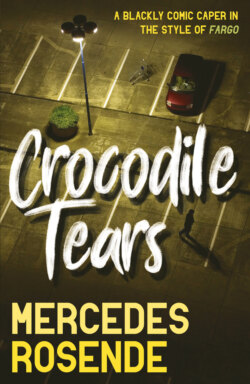Читать книгу Crocodile Tears - Mercedes Rosende - Страница 12
На сайте Литреса книга снята с продажи.
Оглавление49
VIII
Half past two in the morning.
Ursula’s window is slightly open, the curtains are drawn, the blind is halfway down; the room is dimly lit and she has just placed the telescope on the tripod she assembled a moment ago. Five floors below, a taxi rumbles along the cobbles of Calle Sarandí, a homeless guy drags a rattling shopping cart over the irregular surface, a stray dog limps by, trailing one of its hind legs. She observes them from her watchtower, a sentinel in her improvised observation post. Improvised? Not exactly. It’s no coincidence that she is here at the window at this time of night putting the finishing touches to her lookout station; it’s not the first time and it won’t be the last. We ought to talk about why she can’t get to sleep, why she gets up in the middle of the night, what she is furtively searching for right now, but to do that we’d need to delve back into the distant past, which isn’t possible. Ursula doesn’t like digging around in her memories; even with her analyst she is unable to do that.
For her, spying on her neighbours goes through three stages. First, the bad mood triggered by this inconvenient situation of closing the blind, dimming the lights and setting up the telescope that she takes out of its hiding place and which she will have to dismantle and put away again later. Second, the feeling that comes over her when she looks into other people’s lives, the unchecked arousal. And 50finally, the sense of guilt at having done something wrong, the remorse that arrives at the end, the certainty that she should not cross this boundary again. But she knows, how well she knows, that her remorse is no more than crocodile tears, that she will do it again, that she will always return to spying and regretting and then spying again.
But let’s be patient: we are still finishing the first stage, the one where she is in a bad mood because of the work and the inconvenience. The telescope is assembled and in place but Ursula hasn’t occupied her vantage point.
She turns out the final light, places the chair with precision, settles herself neither very close to the edge of the seat nor leaning very heavily on the backrest. She aims the telescope, adjusts the range controls of the German device – a Carl Zeiss Jena inherited from her father – and focuses; she no longer sees the things surrounding her: this gloomy room with obsolete furniture, the display case with the Japanese figurines, the embroidered tablecloth with its faded colours, the slightly worn Persian rugs, the table covered with medicines, the yellowing family photographs sitting on the marble tops of chests of drawers, the walls darkened by the passage of time, her whole house.
Adjusting the instrument, Ursula flies a hundred and fifty yards, passing through the window of a well-lit room with which she is already familiar. In this space, everything is clean and light and uncluttered, everything is modern and complete, the room is painted white, there is a pair of brushed metal lamps with halogen bulbs, some black-and-white photos, a couple of designer armchairs and, in the centre, an enormous square bed. White. She halts when she comes to the couple who are in the middle of their bedtime ritual. The scene is simple and predictable: she undresses 51and puts on a nightdress, he undresses and slips between the sheets. Once in bed, each takes out a book, reads, sometimes they seem to speak. Ursula waits, ten minutes pass, twenty, she begins to lose hope. This is the worst part; the waiting feels eternal, and there is no certainty that her patience will be rewarded. They might just put down their books and turn out the light.
Ursula watches these people she doesn’t know, who barely move, watches them turn the pages, adjust an arm, tug at the blanket, take a sip from a glass of water.
She has observed other couples in her life: many, truth be told. She hates thinking about it. Even more than that, she hates repeating it and knowing she will repeat it, she struggles every day to repress these memories and above all to repress the impulse, and for long stretches of time she is successful. But sometimes there is something like a glimmer, a spark that becomes a fire, and off she goes and sets up her telescope or stops in front of her downstairs neighbours’ door. Ursula has known where to look for many years.
There is a small warning that her wait is over: the woman puts down her book and, instead of kissing the man on the cheek and turning off her bedside light, she strokes his hair and then strokes him again, beneath the sheets. The man puts down his book, turns to her, moves the sheets aside, strokes her neck and kisses her ears. Ursula breathes heavily, following the feline movements of the man and the woman as they touch each other; she watches as one of the nightgown straps falls, she closes her eyes, sighs, opens her eyes again. She watches them lick one another, imagines each taste, each texture, she can smell the musk of their sweat. She pants. The two have commenced their mating ritual, the man is sitting and she is on top of him, they rock 52rhythmically, the woman’s head is tilted back and, squatting, she moves up and down, up and down.
At a precise moment, Ursula stops breathing, and the only thing that exists is the image the telescope offers her.
And then the image is gone, and it is just her.
